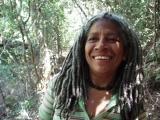Posted on March 14, 2011

Welcome to Gay Central - lush, delectable, voluptuous, warm a cornucopia of provocative and narcotic succulence and the hope to make memory potent enough to fray the line between fantasy and reality.
Well, it's anything but. This play pen, is a predominantly white lesbian hangout and behind the bar is a boy (presumably straight) with a neat goatee. In fact, he is quite pleasing on the eye. And in the rush to serve the women of Lesbos, I'm forced to acknowledge this big chip on my shoulder.
In essence, I got the distinct signal that I should shut up, know my place... and for a moment which seemed to span an eternity, I was floored in disbelief at this blatant disrespect, this stab at my self-esteem.
In all honesty, just how do you react to a barman serving others who came after you? And all what is desired is a beer to slake my thirst.
And if the playing field is supposed to be level and we're all equal before the law, was I justified in being consumed by this pain? I feel rightly so, yet many would fervently disagree.
Here's a hymn many of us know - 'Ag stop living in the past, apartheid is over...'Â blah, blah, blah... all irrelevant to me.
I knew I had to be tolerant, be patient, don't make big deal - after all, the bar was quite busy. Maybe he didn't see me.
Another sore point - questioning my sanity, but mercifully that ended as soon as it was borne. Once again I was making excuses for my own race dilemma, for a few seconds I was being managed by the person behind the bar.
He did see me. I'm the only grey dreadlocked woman and one of the very few people of colour at the bar counter.
I'm overwhelmed by the sheer disdain suffocating me. My mouth is dry and the disbelief is mounting.
Here was a young, white male who had no clue to my life experiences, oblivious to my contributions to this wah-wah new South Africa crammed to the rafters with rights, liberties and laws which he enjoys without any consciousness.
As much as I ought to rail against such ill-treatment, there's a bigger problem at hand. Ignorance is bliss and people are quick in wanting to forget
Get over it, move on. Yes, let's forget about the genocide of our own grandparents. Let's just forget, drink our brandy and coke, go to church and just sit and listen with half an ear and half a heart. The stark reality is we find racism in gay and straight bars, at the til in the corner supermarket, the taxi from town to Wynberg, everywhere...
One of the first links in the chain of events which is the body of my history is Jan van Riebeek's first official speech on April 17, 1658, 'This morning beautiful, clear weather. We have begun to make preparations for the establishment of a school for the Company's Angolan slave children from Dutch slave ship, Amersfoort... school will be held in the morning and afternoon... teaching them the correct Dutch language. To animate their lessons and make them really hear the Christian prayers each slave should be given a small glass of brandy and two inches of tobacco, etc. A register must be established and names should be given to those who do not have any names.'Â
Read Robert Shell's Children of Bondage: A Social History of the Slave Society at the Cape of Good Hope 1652 - 1838. It's a disturbing, yet utterly gripping, examination of where we come from - white, coloured, black... pick a label if you feel the need.
The fact is, 174 Angolan slave children, captured by the Dutch from a Portuguese Angolan slave ship off the Brazilian coast, ended up in Cape Town. They are inextricably bound in this city's shaping; it is a part of everybody's history that must be acknowledged. For this city to truly prosper, grow beyond the geography, this is a must.
That white barman has a pathetic understanding of racism. It's more than just being rude. I challenge him to unlearn his thinking and reflect the true essence of human dignity. Does his family and extended relatives, his near and dear struggle with wretched poverty, alcohol addiction, limited educational opportunities and a dependency to be affirmed by moneyed whites?
Come on a tour and see this city in a different light. It might just save your life.
Edited by Sergio Ben.
Lucy Campbell is a slave heritage site activist in Cape Town